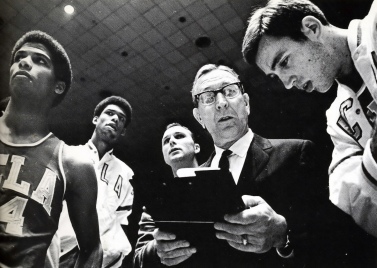As a former high school English teacher, John Wooden always thought of himself as a teacher rather than a coach, and the basketball court was his classroom. He championed teaching, believing that it contributes more to society than any other profession. His teams dominated college basketball throughout the 1960s and 70s, accomplishing an incredible run of 10 NCAA championships in 12 seasons and an 88-game winning streak – records that still stand to this day.
The wisdom of Wooden has filled many books, his quotes speak volumes and his years of coaching greatly influenced not only basketball, but the teaching profession as well. Here are seven of his beliefs on what good coaching and teaching are all about.
1) Know Your Students: Educators would agree that all good teaching begins with students. For Wooden, it was important to come to know each player’s unique strengths and weaknesses. As Wooden says, “They are all different…There is no formula…You can’t work with them exactly the same way. You’ve got to study and analyze each individual and find what makes them tick.” Sound familiar? Concepts of differentiation, personalization and motivation are all integral aspects of Wooden’s coaching philosophy.
2) Intrinsic Motivation: Helping students to discover what motivates them to succeed and reach their potential is one of the greatest gifts teachers can give. Wooden believed that one should strive for personal bests, and not focus on being better than someone else. True motivation is internal. Extrinsic factors such as grades, punishment or recognition pale in comparison to intrinsic ones. This can seen in Wooden’s views on success: “the peace of mind which is a direct result of the self-satisfaction in knowing that you have made the effort to become the best of which you are capable.”
3) Never Stop Learning: Wooden valued improving his knowledge of the game, his players and his coaching methods. Each season, he would select a topic of research, for example rebounding or free throw shooting, and uncover all he could learn about the specific subject. In a similar manner, teachers strive to always be learning through professional development. Like Wooden, one of the purposes for our self-improvement is to help students progress, passing along our new knowledge and skills. This energizes our teaching and keeps it relevant. As Wooden says, “If I’m through learning, I am through.”
4) Effective Feedback: Giving timely and focused feedback to students is essential. Wooden believed in providing immediate error correction to his players. He delivered feedback in 4 second chunks through live coaching (and 20-second chunks after a drill/practice was over). He would use the sandwich model (M+, M-, M+): When you spot an error, stop the player and model how to perform the move correctly (M+), show them how they did it (M-), and then model the move correctly once more (M+). Players viewed the feedback positively because it was actionable and described the solution.
5) Fundamentals Matter: Although drilling is an unpopular aspect of teaching these days, Wooden felt that fundamentals must be mastered first. While teachers often associate drilling with mindless repetition, for Wooden, “drilling created a foundation on which individual initiative and imagination can flourish.” Without a grounding in the fundamentals of the discipline, higher order work cannot be done with much initiative, imagination or individuality. Wooden transformed the ‘drill and kill’ to the ‘drill and skill’, allowing players to transcend the routine and reach a new level of understanding.
6) Whole-Part-Whole: Wooden’s basic teaching theory was whole-part-whole, in which he would introduce the big concept, break it down into its parts and then re-construct the whole with a new awareness of its meaning and use. Teachers are quite familiar with this approach, but sometimes we can lose sight of the big picture. We need to ensure we always provide students with a meaningful context and address the why before the how to. And that we answer the ‘what’s the point of learning this?’ and ‘what’s in it for me?’ questions that are echoing in students’ minds.
7) Character is Key: The foundation of John Wooden’s philosophy is built on his belief that the values and actions of the educator are essential for good teaching. As he once said, “It’s what the teachers are themselves.” It is our example, our ethics, and what kind of people we are that truly matters. Years down the road, students will have forgotten most of what we taught them, but hopefully they will remember the life lessons we imparted, the way we treated them and the character of our being.
Inspiration is everywhere. Look to other professions for advice on teaching, as there is wisdom to be gained from all walks of life. Every discipline has insights that will benefit teachers, and incorporating ideas from diverse perspectives will ensure our profession evolves and grows.
Everyone we meet has something to teach us.
